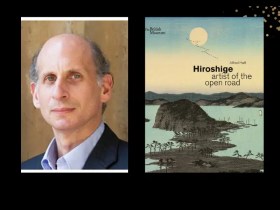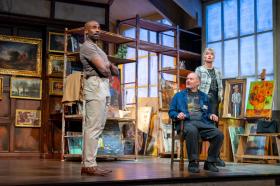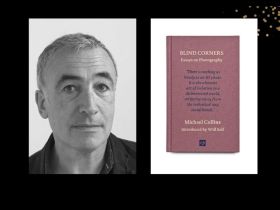On those occasions when director Alfred Hitchcock interviewed journalists at his Cromwell Road flat, he`d disrobe to the waist, cover his belly-button with lipstick and then proceed to do the hula to the chagrin of his guests.
Born in Leytonstone, then Essex, now East London, the director never shed his working-class roots and any number of British Hitchcock films are replete with cockneyisms that baffle many of his biggest fans.
The National Film Theatre is showing `The Lodger` and `The 39 Steps` in May whilst `Blackmail` has often been shown. `The Man Who Knew Too Much`- the British 1934 version- was recently aired at the National Portrait Gallery in London where I talked about the film and played excerpts from an interview which I did with the director in Hollywood in 1972. Both the interview and the film were interlaced with the director`s raunchy cockney humour.
Even `Frenzy`, a film made for Hollywood in 1972, about London`s old Covent Garden market- soon to be moved to Nine Elms in 1974- is significant on account of its cockneyisms. I howl every time I view the scene at the marriage bureau where the towering Australian lady and her pint-size husband (the eponymous `Neville`) tell Monica Barling that the marriage has succeeded because `Neville brings me my tea at 6am every morning after cleaning the house and before he makes breakfast and does the washing up`. It makes me howl even to think about it, possibly because the actress Hitch used to play it played it so blissfully deadpan.
But this was tame compared to Hitch`s use not only of ribald but downright vulgar cockneyisms in other films. Consider Clare Greet, the cleaning lady, in `The Man Who Knew Too Much` (1934) padding around without her shoes and stockings because the radicals do not want her to escape (and report them to the police)
Even in later films Hitchcock`s use of domestics was always racy- never Americanised- and they always remained caricatures of some sort. Consider the lift operator in `North by Northwest` or the housekeeper and hotel maid in the same film? Consider the images of maids, taxi drivers, housekeepers and other menials in films by other directors. Hitch`s are decided grotesques.
Thelma Ritter, the insurance nurse in `Rear Window`, was as mad as a hatter and Hitchcock exploited every crazy inch of her.
When I interviewed him in 1972 he told me that he refused to cast by type and always used actors who contradicated the general idea of barmaids, housekeepers, hotel maids and insurance nurses. He mentioned that the barmaid used in the pub, the Nell of Old Drury in Covent Garden, was typical enough but that he turned down every one of the busty barmaids sent by casting for the prime part of `Babs` in the film `Frenzy`. (Anna Massey was eventually chosen to play the role)
The scenes in `Blackmail` in the tobacconist shop owned by Alice`s father play out the lower-middle class cliches as does the conversation between the father and the policeman which is nothing more than prejudiced banter about crime (and those types) in the capital. In this instance `those types` probably referred to communists or Jews and maybe the Irish (Hitchcock`s own clan).
Criticized for appearing to sanction the cliches, Hitchcock himself appeared as a member of the gang which pursued Ivo Novello whom they preceived to be Jack the Ripper in the director`s great silent film, `The Lodger` .
Whilst he may have been an Aryanist, he was not a racist and while using the Germanic physical type to large extent, he did say in the 1972 interview which I conducted that the Germans deserved a dose of their own medicine `and then we`d see how `they` like it`.
Still, many of his pre-war films exploited the racist motif, such as the casting of Jewish refugee Peter Lorre in the 1934 `The Man Who Knew Too Much`. Lorre was so upset by the antiSemitic film cliche he was forced to play (in this and other films) that he became addicted to morphine for the rest of his life.
In Hitchcock`s adaptation of Synge`s `Juno and the Paycock` he interpolated into the plot an antiSemitic caricature wholly missing from the play original. And in his film, `Murder`, based upon the book by Clemence Dane, he physicalized the half-caste status of the villain by caricaturing him as a homosexual and a Jew. Whilst exercising greater self-restraint following the Holocaust, Hitchcock did in `North by Northwest` create a homosexual character and cast the Jewish actor Martin Landau to play the role.
`Sabotage` has some very pedestrian sequences, including the foray into the bird shop (modelled on a real shop in Islington) Hitch used the motif again in the second version of `The Man Who Knew Too Much` when James Stewart visits the Camden taxidermist and gets caught up in a lower-middle class scenario of xenphobia and is perceived to be (by the London locals) a lunatic American.
Classic of course are the scenes in `The 39 Steps`, particularly near Portland Place, with the milk wagon and law court, juxtaposed to Hannay`s reckless overnight adventure with a mysterious woman spy.
Interesting that when they staged `The 39 Steps` as a play in London`s West End, the producers chose to refer to it as `Hitchcock`s The 39 Steps` (rather than crediting the author, John Buchan). For good reason, too; the West End version both isolates and exaggerates the comedic elements of the Hitchcock film.
This production is complete and total farce; the comedic aspects of the film not only punctuate (as with Hitchcock) but sustain the plot scenario.
Thus even the most serious moments of the thriller film are being played for laughs and comic motifs are intensified such as cross-dressing, xenophobia, marital bullying, etc.
To understand the cinema of Alfred Hitchcock you have to understand where he came from; how that background influenced him; how it finds its way into his films even the sophisticated American ones.




